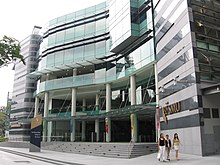シンガポールマネージメント大学
この項目「シンガポールマネージメント大学」は途中まで翻訳されたものです。(原文:英語版 "Singapore Management University" 2012-05-25, 03:56 (UTC)) 翻訳作業に協力して下さる方を求めています。ノートページや履歴、翻訳のガイドラインも参照してください。要約欄への翻訳情報の記入をお忘れなく。(2017年7月) |
シンガポールマネージメント大学 (略称: SMU; 中国語: 新加坡管理大学; マレー語: Universiti Pengurusan Singapura; タミル語: சிங்கப்பூர் நிர்வாக பல்கலைக்கழகம்)は、2000年に設立されたシンガポールの大学である。別名はシンガポール経営大学。
| Singapore Management University | |
 | |
| 設立年 | 2000年 |
|---|---|
| 総長 | J. Y. Pillay |
| 学長 | Lily Kong |
| プロヴォスト | Lily Kong(代理) |
教員数 | 300人 |
| 学部生 | 8182人 |
| 大学院生 | 1828人 |
| 所在地 |
シンガポール ブラスバサー 北緯1度17分48秒 東経103度50分59秒 / 北緯1.29667度 東経103.84972度座標: 北緯1度17分48秒 東経103度50分59秒 / 北緯1.29667度 東経103.84972度 |
| 公共交通 | ドビーゴート駅、シティホール駅、ブラスバサー駅 |
| スクールカラー | SMUブルー とSMUゴールド |
| 公式サイト | www.smu.edu.sg |
SMUは、変化の多い時代に対応できるリーダーや起業家を輩出することを目的に、シンガポール政府が出資し、シンガポール国立大学(NUS)・ナンヤン理工大学(NTU)の英国式カリキュラムとは異なる、世界トップクラスの米国式ビジネススクールであるペンシルベニア大学ウォートン・スクール(Wharton)をモデルとして、2000年1月12日に設立された。学部・大学院併せて約10000人が在籍している。現在は、会計学、経営学、経済学、情報システム学、法学、社会科学の6つのスクール及び大学院研究と統合研究の2つのカレッジから構成され、学士、修士及び12の博士課程が開設されている。30以上の研究所とCOEを保有する他、専門職教育課程では専用の企業研修と生涯学習を受けられる。SMUはマネジメント(MBA)教育に関する第三者評価機関AACSB、EQUIS、AMBAからトリプル国際認証を受けている。少人数制でゼミ形式での教育を特徴とする。SMUのキャンパスは南部にあるNUSや西部にあるNTUと違い、シンガポールの中心部に位置しており、実業界とのつながりが強い。
歴史
編集1997年、シンガポールにシンガポール国立大学(NUS)、ナンヤン理工大学(NTU)に続く第三の大学を作る最初の計画が持ち上がった。
その後、リゾートホテルチェーンであるバンヤンツリーでExective Chairmanを務める何光平氏(Ho Kwon Ping)が議長として任命され、アメリカの大学教育をベースとしながらも、より柔軟かつ幅広い高等教育を行う方針が決定された。学部教育のモデルとしては米ペンシルベニア大学ウォートン・スクールが選ばれた。ウォートン・スクールとは1999年2月に協定が結ばれ、同年6月にはWharton-SMU Research Centerが設立された[1]。
2000年、シンガポールマネージメント大学は、シンガポール郊外のエヴァンスロードにあるHwa Chong Institutionの一角をブキティマキャンパスとして開学した。そして5年後の2005年には、4つのスクール、図書館、3つの研究機関を伴う大学として、シンガポールの商業・文化の中心地であるドビー・ゴートへの移転を完了した(シティキャンパス)。その後、Law Schoolの開設、School of Economics and Social Sciencesの改組(School of EconomicsとSchool of Social Sciences)を経て、現在の体制となった[2]。
特に、起業家・イノベーション教育に定評があり、SMUビジネススクール(Lee Kong Chian School of Business)は、フィナンシャル・タイムズ紙の2021年経営管理修士(MBA)プログラム世界ランキングで58位、アジアで13位にランクされている[3]。
大学方針
編集Following a strategic review by the university management, senior faculty and the Board of Directors, Professor De Meyer announced the strategic goals of a five year plan in his SMU President’s State of University Address 2011[4]. These goals are to:
- Raise the reputation and international profile of SMU.
- Continue to deliver a holistic undergraduate education experience with a distinctive interactive pedagogy, involving multi-disciplinary perspectives and a culture of rigorous learning and innovation.
- Foster a stimulating and dynamic research culture combining focused disciplinary research with opportunities for multi-disciplinary perspectives.
- Become an Asian knowledge hub for research centred around the world of business and management.
- Develop high quality graduate, professional and executive education programmes.
- Ensure financial strength that sustains growth and innovation.
学部・スクール
編集- School of Accountancy
- Lee Kong Chian School of Business
- 2004年、東南アジアの財団から5,000万シンガポールドルの寄付を受け、スクール名をLee Kong Chian School of Businessとした。[5]BBM(Bachelor of Musiness Management、経営学学士)の他、MBA、EMBA、MSc、PhDの各プログラムを提供しており、スクールとしてAACSBおよびEQUISからの認定を受けている。[6]
- School of Economics
- School of Information Systems
- School of Law
- School of Social Sciences
- College of Graduate Research Studies
- College of Integrative Studies
ランキング
編集- QS世界大学ランキング[7] 2022 in Business and economics: ビジネス/経営学36位, 会計学49位, 経済学60位
- FT世界大学ランキング2021の経営管理修士(MBA)プログラム分野で世界58位、アジア13位[3]
- Singapore Management University was ranked 52nd worldwide in 2012 by The University of Texas at Dallas Top 100 Worldwide Business School Ranking.[8]
- SMU was rated as a 4 Palms Business school (world top 300) by Eduniversal in 2011.[9]
- Singapore Management University (as an entire university) was ranked 28th out of all business schools in the world by Webometrics (Ranking Web of World Business Schools) in Jan 2011.[10]
- SMU was ranked 10th worldwide and 1st in Asia by The Accounting Review for the number of refereed articles accepted for publication in 2009.[11]
日本の学生交流協定校
編集出身者
編集教員
編集- ピユシュ・グプタ - 理事長、シンガポール企業庁(Enterprise Singapore)Board member、DBS銀行CEO。
- パン・ヤン・フーン(Pang Yang Hoong) - 初代学長・名誉教授。シンガポール会計企業規制庁(ACRA) Board Member。
- ロナルド・フランク(Ronald Frank) - 第2代学長。元ペンシルベニア大学ウォートン・スクール副学部長。
- アルヌード・ド・マイヤー - 第4代学長、INSEAD元MBAプログラム学部長・シンガポール分校創設者。
- リリー・コン - 第5代学長、元シンガポール国立大学シニアマネジメント。
- ハワード・トーマス(Howard Thomas) - リー・コンチェンビジネススクール(Lee Kong Chian School of Business)名誉教授・元学部長。シカゴ大学MBA・ロンドン大学MSc。元AACSB取締役会長。
- トーマス・サージェント - 経済学者、元特別教授。アメリカ経済学会(AEA)会長、元スタンフォード大学・シカゴ大学・ニューヨーク大学教授、元ペンシルベニア大学准教授。ノーベル経済学賞受章。
- ポーリン・テイ・ストローハン - 学生部長・社会学教授。シンガポール首相官邸行政勲章(Public Administration Medal 2010, Prime Minister's Office)Bronze受章。
- 好川透 - リー・コンチェンビジネススクール(Lee Kong Chian School of Business)元教授[12]、早稲田大学社会科学総合学術院教授。
- 藤井朋樹 - 経済学部准教授・副学部長[13]
- 梶井厚志 -経済学者、客員教授
- 高橋一 - 統計学者、元客員教授
卒業者
編集脚注
編集- ^ History of the Singapore Management University at the Wayback Machine (archived 2012-07-21)
- ^ School of Social Sciences - About the School at the Wayback Machine (archived 2012-10-05)
- ^ a b http://rankings.ft.com/businessschoolrankings/global-mba-ranking-2021
- ^ SMU President’s State of University Address 2011 at the Wayback Machine (archived 2012-05-18)
- ^ Lee Kong Chian School of Business - Overview at the Wayback Machine (archived 2012-10-29)
- ^ SMU ranking - About the School at the Wayback Machine (archived 2013-04-08)https://www.aacsb.net/eweb/DynamicPage.aspx?Site=AACSB&WebKey=4BA8CA9A-7CE1-4E7A-9863-2F3D02F27D23
- ^ https://www.topuniversities.com/universities/singapore-management-university
- ^ SMU ranking - About the School at the Wayback Machine (archived 2013-04-08)
- ^ Eduniversal - University and business school ranking in 4 palms at the Wayback Machine (archived 2015-09-29)
- ^ Ranking Web of World Business Schools at the Wayback Machine (archived 2012-06-26)
- ^ https://docs.google.com/viewer?a=v&q=cache:wS7LDf9TN2IJ:fasri.net/wp-content/uploads/2009/08/annual-report-and-editorial-commentary-for-the-accounting-review.pdf+the+accounting+review+annual+report&hl=en&gl=sg&pid=bl&srcid=ADGEESiODDhRd3N2tUvhiMejZYi7RXA1vPBPV6qIjNasABwELCcqhKbRquj4uTsPNl8CTRE0CIsnQ8QMSSyUbD1zCYjWqTZ4LJ7YniIpvn6-XkILCwmXrT0ZHH1zlTXsASRPK_-njyio&sig=AHIEtbR8A0TA8RgxnxJM3hZqiFWywIYKhQ- SMU ranking - About the School[リンク切れ]
- ^ https://business.smu.edu.sg/doctor-business-administration/faculty
- ^ https://faculty.smu.edu.sg/profile/tomoki-fujii-2116